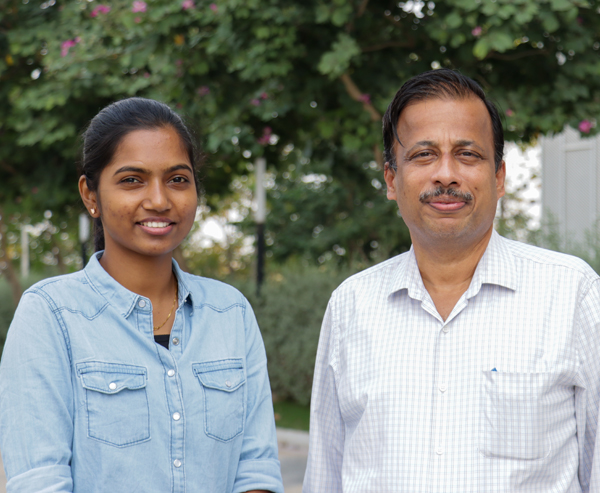 “Progress in Alternative Strategies to Combat Antimicrobial Resistance: Focus on Antibiotics” is a paper authored by Prof Jayaseelan Murugaiyan, Professor & Head, Department of Biological Sciences at SRM University-AP and his research scholar Ms Saranya Adukkadukkam, in Antibiotics Journal, having an impact factor of 4.639. It is a remarkable achievement that our university served as the first and the corresponding authors of this paper published in association with “Global AMR Insights Ambassadors Network”. A total of 21 co-authors from 13 countries (India, UK, France, The Netherlands, Switzerland, Italy, Spain, Ukraine, Lebanon, Egypt, Uganda, Bangladesh, and Nigeria) and six Indian universities (including SRM AP) participated in this work.
“Progress in Alternative Strategies to Combat Antimicrobial Resistance: Focus on Antibiotics” is a paper authored by Prof Jayaseelan Murugaiyan, Professor & Head, Department of Biological Sciences at SRM University-AP and his research scholar Ms Saranya Adukkadukkam, in Antibiotics Journal, having an impact factor of 4.639. It is a remarkable achievement that our university served as the first and the corresponding authors of this paper published in association with “Global AMR Insights Ambassadors Network”. A total of 21 co-authors from 13 countries (India, UK, France, The Netherlands, Switzerland, Italy, Spain, Ukraine, Lebanon, Egypt, Uganda, Bangladesh, and Nigeria) and six Indian universities (including SRM AP) participated in this work.
Antimicrobial resistance (AMR) – the ability of microorganisms to survive antimicrobials – is a global healthcare concern. AMR contributes to 1.27 million deaths among the 4.95 million deaths associated with bacterial AMR. If no control measures are taken, it is estimated that by 2050, it will claim the lives of 300 million people. The rise of these “superbug bacteria’s” – means that trivial medical interventions will soon become once again high-risk since no efficient antimicrobial chemotherapy is available. It is, therefore, crucial to understand the current situation and identify alternatives to combat the emergence and spread of antimicrobial resistance. This paper comprehensively discusses the alternative approaches that can be effectively utilised to combat AMR and, at the same time, without inducing further resistance among the pathogens. The paper has great social implications in making society aware of the scenario and encouraging the researchers to focus on alternative strategies to combat AMR.
Abstract of the paper: Antibiotic resistance, and, in a broader perspective, antimicrobial resistance (AMR), continues to evolve and spread beyond all boundaries. As a result, infectious diseases have become more challenging or even impossible to treat, leading to an increase in morbidity and mortality. Despite the failure of conventional, traditional antimicrobial therapy, in the past two decades, no novel class of antibiotics has been introduced. Consequently, several novel alternative strategies to combat these (multi-) drug-resistant infectious microorganisms have been identified. The purpose of this review is to gather and consider the strategies that are being applied or proposed as potential alternatives to traditional antibiotics. These strategies include combination therapy, techniques that target the enzymes or proteins responsible for antimicrobial resistance, resistant bacteria, drug delivery systems, physicochemical methods, and unconventional techniques, including the CRISPR-Cas system. These alternative strategies may have the potential to change the treatment of multi-drug-resistant pathogens in human clinical settings.
Global AMR Insight Ambassador Network: AMR Insights, an international network-based organisation interacting with professionals around the globe: in Human and Veterinary Health, Agri-food and Environment, was set up in 2017 following an in-depth feasibility study towards a new information platform on AMR. It mainly focuses on informing, educating and connecting people with the aim to curb antimicrobial resistance. Prof Jayaseelan Murugaiyan and Ms Saranya Adukkadukkam are members of the Global AMR Insights Ambassador Network.
Ms Saranya Adukkadukkam, the co-author from SRM AP says:
The guidance of Prof Jayaseelan Murugaiyan is the pillar of my research. His support and passion for research always encourage me. He gives importance to translational research and motivates me to stand unique in the field. He shows me a path where I can serve the people through research. Foreseeing my future as a scientist, he guides me to more opportunities to collaborate with international scientists. I feel proud of my mentor Prof Jayaseelan Murugaiyan for letting me fly. Also, I thank SRM University-AP for providing generous fellowship, excellent research facilities and ambience to carry out the research.

